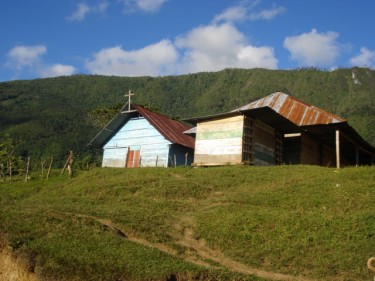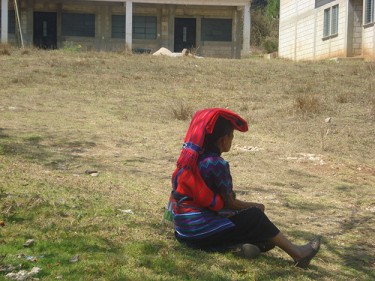Update (27 October, 2011):
An earlier version of this post stated that two generals, not three, had been arrested. The post has been amended accordingly.
Guatemalan courts are set to face a challenge without precedent in the country: prosecuting genocide. After three decades of failed efforts to prosecute the Guatemalan Army, three generals are finally under arrest, accused of perpetrating genocide and other war crimes against the Maya Ixil people in the years 1982-83 by massacring and burning entire villages. More arrest warrants will follow.
Former General Hector Lopez Fuentes was the first arrested in connection with genocide in Guatemala. His arrest was followed by the detention of José Mauricio Rodríguez Sánchez, now in prison, and Oscar Mejía Victores, who is under hospital arrest whilst he is being evaluated to check if his health will allow him to stand trial, as reported by Mike in the blog Central American Politics.

Location where the massacres took place in the Triangulo Ixil, Quiche, Guatemala. Image by Renata Avila, dedicated to the public domain.
In the words of the 1999 report by the Commission for Historical Clarification (CEH for its initials in Spanish) [es]:
The Army's perception of Mayan communities as natural allies of the guerrillas contributed to increasing and aggravating the human rights violations perpetrated against them, demonstrating an aggressive racist component of extreme cruelty that led to extermination en masse of defenseless Mayan communities, including children, women and the elderly, through methods whose cruelty has outraged the moral conscience of the civilized world.
NISGUA blog describes:
The members of the military with arrest warrants formed part of the Department of Defense in the de facto government of General Efraín Ríos Montt and actively participated in the intellectual planning of the genocide against the Maya Ixil people through Plan Victoria 82. Their roles were fundamental in the commission of crimes against humanity and genocide during this time.
Efraín Rios Montt, a former dictator and now member of the Guatemalan Congress, has not been not re-elected and will lose his immunity on January 14, 2012, when his mandate ends.

Maria Toj, a genocide survivor and advocate for justice. Image by Renata Avila, dedicated to the public domain.
As the blog Unredacted explains, it is likely that declassified official government records from both Guatemala and the United States will be used as evidence:
In 2009, the National Security Archive introduced Plan Sofía
One of the key records associated with Plan Sofía is a telegram from Army Chief of Staff López Fuentes to the commander of his Special Forces airborne brigade ordering the launching of Operation Sofía in the Ixil region of the Quiché.
The counterinsurgency assault that resulted displaced hundreds of Mayan residents and left an unknown number dead as soldiers destroyed their villages, burned their houses and slaughtered their livestock. (See summaries of witness testimony and more about the Spanish proceedings here.)
International Law Girls analyzes the importance of this process for the Guatemalan system of justice:
Guatemalan law allows for repeated delays in criminal cases as interlocutory challenges move through a lengthy appeals process. Many people involved in the genocidal campaigns of the 1980s still hold positions of power – including the country’s frontrunner for the presidency, Otto Perez Molina. If it is successful, the prosecution will be a breakthrough for the fight against impunity on a scale with the conviction of Peru’s former president Fujimori.
While families of the victims, who are following [es] the hearings closely, applauded [es] the arrests, some citizens strongly oppose the prosecution of the army, arguing that the country has to dedicate efforts to solving current violence and that forgiveness and reconciliation should be the goal.
Others mention that former guerrilla force members should be prosecuted too, arguing that an amnesty should not shield them from the responsibility and involvement in crimes against civilians [es], although a truth commission found that guerillas only participated in 3% of the crimes, as pointed out by Central American Politics in the post “Why not prosecute guerrillas?”.
Amnesty is inapplicable for international crimes, including genocide, torture, and forced disappearance. The struggle for justice in Guatemala is a heroic effort: less than 5% of cases are prosecuted every year. It seems that finally decades of effort by victims’ associations will deliver justice to the families who survived the war.







2 comments